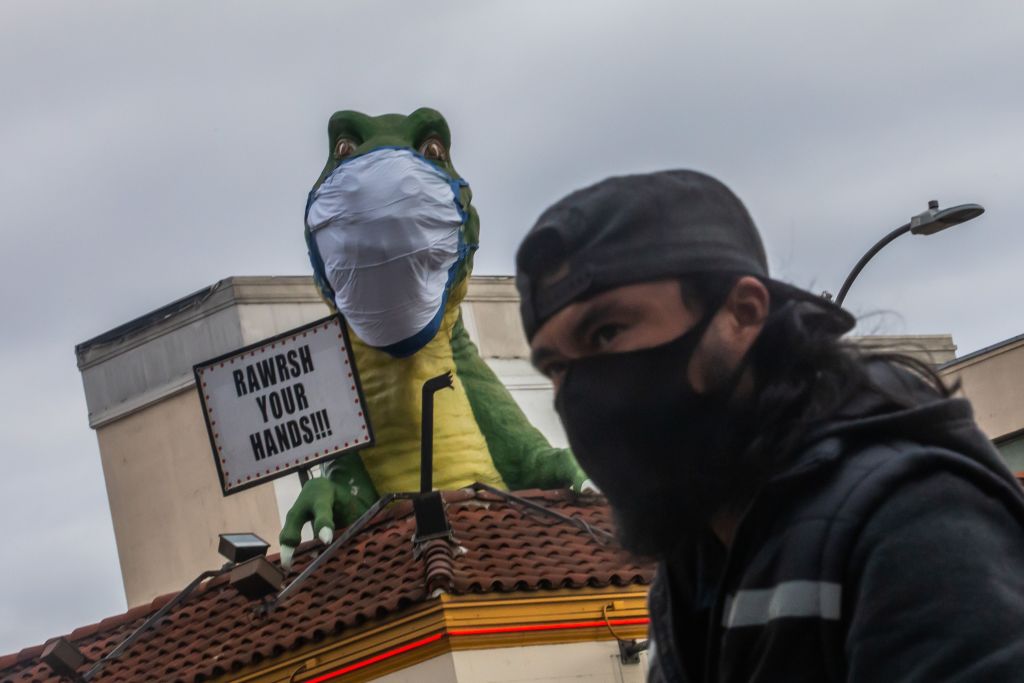There are 4 requirements for reopening the U.S. amid COVID-19. Americans won't tolerate all of them.


A free daily email with the biggest news stories of the day – and the best features from TheWeek.com
You are now subscribed
Your newsletter sign-up was successful
The White House has proposed a list of "preparedness responsiblities" for lifting social distancing rules enacted to slow spread the COVID-19 coronavirus. States should be able to test for the coronavirus, contact trace, and ensure hospitals have enough personal protective equipment (PPE) and ICU capacity for when the virus flares up again. Individuals should wear face masks when they can't keep six feet apart in public.
Testing, tracing and isolating, hospital readiness, and masks are the four main pillars of reopening, dozens of scientists, public health experts, and disease historians told The New York Times and ProPublica, but the White House is seriously lowballing the amount of testing needed and skimming over some difficult choices America must make. Keeping the economy locked down isn't sustainable, but "the White House's 'phased' plan for reopening will surely raise the death toll no matter how carefully it is executed," Donald McNeil Jr. writes at the Times. "The best hope is that fatalities can be held to a minimum."
A vaccine — the generally accepted prerequisite for a return toward normalcy — is realistically 18 months away at the earliest. All the experts agreed the U.S. needs to massively ramp up testing for both the virus and, separately, the antibodies that show who has already recovered — and they all agreed the U.S. is nowhere near ready for this. The U.S. also has tens of thousands too few workers trained to trace everybody who came in contact with every infected individual.
The Week
Escape your echo chamber. Get the facts behind the news, plus analysis from multiple perspectives.

Sign up for The Week's Free Newsletters
From our morning news briefing to a weekly Good News Newsletter, get the best of The Week delivered directly to your inbox.
From our morning news briefing to a weekly Good News Newsletter, get the best of The Week delivered directly to your inbox.
China, South Korea, and other countries have supplemented the labor-intensive task of contact tracing with smartphone monitoring, a step the U.S. has neither the legal framework nor the civil-liberties culture to embrace. And however the positive cases are identified, the next step is even thornier. "To keep the virus in check, several experts insisted, the country also must start isolating all the ill — including mild cases," McNeil writes. China sent everyone testing positive to make-shift infirmities, while Taiwan paid infected citizens to quarantine in hotels.
"Separating people from their families for 14 days is a very tough thing to do," and "it would be massively unpopular" in America's "family-centered society," ProPublica notes. But "what we've learned in Italy, Taiwan, and now our country is sobering," and it's that when people self-isolated at home, "the disease spread to the entire family, sometimes sickening multiple generations." Read more about our coronavirus future at The New York Times.
A free daily email with the biggest news stories of the day – and the best features from TheWeek.com
Peter has worked as a news and culture writer and editor at The Week since the site's launch in 2008. He covers politics, world affairs, religion and cultural currents. His journalism career began as a copy editor at a financial newswire and has included editorial positions at The New York Times Magazine, Facts on File, and Oregon State University.
-
 Democrats push for ICE accountability
Democrats push for ICE accountabilityFeature U.S. citizens shot and violently detained by immigration agents testify at Capitol Hill hearing
-
 The price of sporting glory
The price of sporting gloryFeature The Milan-Cortina Winter Olympics kicked off this week. Will Italy regret playing host?
-
 Fulton County: A dress rehearsal for election theft?
Fulton County: A dress rehearsal for election theft?Feature Director of National Intelligence Tulsi Gabbard is Trump's de facto ‘voter fraud’ czar
-
 TikTok secures deal to remain in US
TikTok secures deal to remain in USSpeed Read ByteDance will form a US version of the popular video-sharing platform
-
 Unemployment rate ticks up amid fall job losses
Unemployment rate ticks up amid fall job lossesSpeed Read Data released by the Commerce Department indicates ‘one of the weakest American labor markets in years’
-
 US mints final penny after 232-year run
US mints final penny after 232-year runSpeed Read Production of the one-cent coin has ended
-
 Warner Bros. explores sale amid Paramount bids
Warner Bros. explores sale amid Paramount bidsSpeed Read The media giant, home to HBO and DC Studios, has received interest from multiple buying parties
-
 Gold tops $4K per ounce, signaling financial unease
Gold tops $4K per ounce, signaling financial uneaseSpeed Read Investors are worried about President Donald Trump’s trade war
-
 Electronic Arts to go private in record $55B deal
Electronic Arts to go private in record $55B dealspeed read The video game giant is behind ‘The Sims’ and ‘Madden NFL’
-
 New York court tosses Trump's $500M fraud fine
New York court tosses Trump's $500M fraud fineSpeed Read A divided appeals court threw out a hefty penalty against President Trump for fraudulently inflating his wealth
-
 Trump said to seek government stake in Intel
Trump said to seek government stake in IntelSpeed Read The president and Intel CEO Lip-Bu Tan reportedly discussed the proposal at a recent meeting
